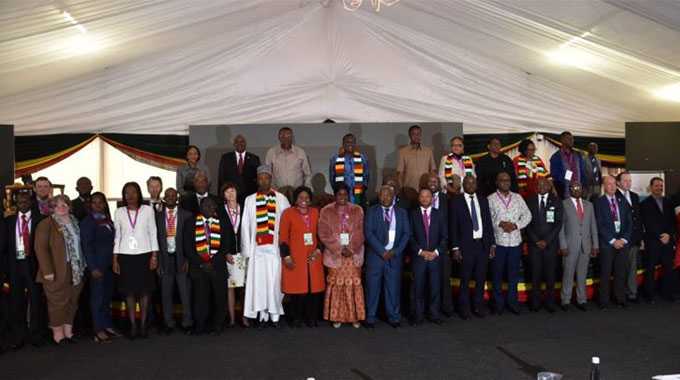Africa’s diaspora: To return or not?

Or is it?
Since the onset of the global financial crisis in 2008, trouble has crept into paradise and the dream, either of success and happiness in the West, or of a triumphal return to the homeland, has taken on a rather disillusioning twist for many. “Arduous, long and uneven” is how the governor of the Bank of England, Mervyn King, described the British economy’s path to recovery.
In the same week, the International Monetary Fund also was unveiling a dampening prognosis of the global economy’s growth prospects.
The global economy’s growth forecast for 2012 had now come down to 3,25 percent from an earlier forecast of four percent, it said.
From the UK’s Office of National Statistics (ONS), figures told of over 2,6 million people unemployed and record numbers claiming unemployment benefit — 1,6 million in all.
Despite the coalition government’s austerity measures of budget cuts, no growth ensued and the economy contracted by 0,2 percent in the last quarter of 2011.
Across the pond in the US, the same depressing numeric narrative holds sway: 13,1 million people out of work despite a marginal 0,6 percent decline in the unemployment rate since August 2011.
In the EU, the unemployment rate stands at 9,8 percent as of November 2011.
Nobel Prize winning economist Joseph Stiglitz sums up the sense of gloom thus: “Fundamental problems in the US and Europe are deep.
“Looking at it from the point of view of the US workers, no one really anticipates us being back to normal before 2017, and that’s optimistic.”
But while (Africa South of the Sahara) remains vulnerable to contagion from the global financial crisis and could well be sucked into its vortex if the global crisis persists, its current economic outlook is in sharp contrast to the West’s.
Mouth-watering growth figures litter Africa’s economic terrain, and the IMF puts average growth estimates for 2012 between 5,25 and 5,75 percent.
In fact, across the length of the continent, several countries having been growing phenomenally and consistently over the last few years.
There is a new spring in their step, with their citizens making entrepreneurial forays into the various sectors of their fledgling economies and generally looking ahead with a renewed sense of optimism and self-belief.
So, is it time for the African Diaspora to call time on their stay in the West and return home? Anecdotal evidence from a number of African countries shows there is a steady pattern of return which has in no small measure been bolstered by the economic recession in the West.
In the US, there is a growing number of Africans who are courageously binning the shards of their broken American dreams and taking the brave step homewards.
Others are not so lucky though, having spent years working as undocumented aliens in the shadow of Uncle Sam’s immigration authorities and living off cash in hand jobs when the economy was good.
But now they can barely afford the one-way ticket back to Africa. Sammy Maina, a Kenyan immigrant who was until last year based in the US, said chasing the American dream was so demanding that it had cost several of his African friends their marriages and even led some to commit suicide.
“It is very difficult right now and so many people are packing and going back to Kenya in big, big numbers,” he told BBC.
Up to one million Africans are estimated to live in the US and according to the homeland security department, 130 000 Africans migrate legally to the US each year.
Some Senegalese community organisers in New York also revealed they were inundated with requests from expatriates who have lost their jobs, are facing
homelessness, and who want financial help to return home.
Nigeria is one country that is receiving a steady flow of returnees from its Western-based Diaspora in a move that is turning out to be a brain gain for the country.
Media reports suggest the return of foreign-based professionals has tightened competition on the job market, with recruiters receiving “a deluge of applications” from foreign-based job-seekers desirous of returning home.
“At the height of the recession in Europe and the US it was crazy because everyone was getting in touch saying they wanted to go home,” says Ade Odutola from the job recruitment website Wazobiajobs.com.
“It’s calmed down a bit now but lots of Nigerians who left in the 1980s and early ‘90s are now seeing other people being successful back home and that’s a real magnet pulling them back.”
While opportunities certainly abound, it is no walk in the park for returnees, though, as they have to contend with basic infrastructure problems. Electricity only works for a few hours every day and the streets in Lagos in particular are clogged with traffic.
A few months ago, the BBC featured Tunde Ogunrinde, a Nigerian fastfood chain operations manager who had swapped life working in management for a fastfood chain in Birmingham, England, for his country of birth two years ago. “Growth here was going in the right direction, whereas in Europe it was flattening out. It’s time to capitalise,” he said.
Across Africa, economic growth is riding on the back of the global commodities boom. In Nigeria, it is oil wealth that has made it possible for employers to pay top dollar to their returning expatriates.
If recession elsewhere leads to a collapse in the demand for oil, Nigeria could still find itself sucked into the world’s economic problems.
“Oil drives the economy here,” says financial analyst Bismarck Rewane.
“Oil revenue drives investment; oil revenue drives government expenditure and consumer purchasing power. That’s the bottom line.”
South Africa has also seen a steady flow of returnees from the Diaspora.
South African expatriates, often white and well-educated, are flocking back home from recession-hit UK, Australia, New Zealand and the US.
A study by recruitment agency Adcorp shows that of the 285 000 South Africans, mostly highly qualified whites, who had left to work abroad since 1990, almost 40 000 returned home between mid-2009 and mid-2010.
Some were quite hard-pressed and didn’t even have the money to move back home, according to Tyron Whitley, a returnee from London who now runs a company that ships returning South Africans’ cars from her Durban base.
Her thriving business is evidence of just how many fellow South Africans are voting with their feet and returning home.
Media reports from Kenya dating as far back as March 2009 claim that thousands of Kenyans have been trooping back to their country from overseas every month, “broke and jobless” as the effects of the global financial crisis continued to spread.
The Nation website quoted a Ministry of Immigration official as saying that thousands of Kenyans were opting for home instead of languishing in foreign countries where the economic recession was blighting them to penury.
Following the establishment of a power-sharing government and the adoption of the US dollar as the official currency in Zimbabwe, the resultant political and economic stability has drawn some of the country’s nationals back from the Diaspora.
The topic of return continues to animate Zimbabwean online forums, with opinion sharply divided on whether it was time for those in the West to return home and pursue the unfolding opportunities, or hold their breath until new elections promised by President Mugabe this year but opposed by Prime Minister Morgan Tsvangirai.
“It’s the basics that we need in place; the politics can sort itself out,” said UK-based Zimbabwean, Nate Ncube.
“(First we need) reliable services like the supply of clean water, electricity, sewage and waste removals, reliable service provision like affordable health, education and a secure environment where the rule of law is respected by all.
“Also, it’s difficult to plan or budget when there’s constant price fluctuations and talk of a change of currency.”
Another UK-based Zimbabwean who had just returned from a visit to the country said his trip had brought his repatriation plans into sharp perspective.
“The longer one stays in the West the more difficult it is to reconcile oneself to the poor standards, like living for long stretches without electricity or running water, for instance,” he said.
“You’ll need thousands of dollars per term for decent private school education, and if you have family you’ll need to run two cars as public transport’s pathetic. In short, you can only return to Zimbabwe if you’re truly sorted, otherwise it’ll be like jumping into the deep end.”
Lance Mambondiani, a UK-based Zimbabwean investment executive and blogger, recently observed that for those Zimbabweans who had migrated to the UK for better prospects, the economic advantage of being in the Diaspora was premised on a crumbling economy back home where the pound sterling earned a fortune on the parallel market.
But this advantage had vanished with dollarisation of the Zimbabwean economy, and the European economic downturn had now driven the final nail in its coffin. “To migrate or not to migrate remains an intimately personal decision.
“The choice, however, maybe be easier if the global economic crisis continues to bite,” concluded Mambondiani.
- Innocent Chofamba-Sithole is a Zimbabwean journalist based in the United Kingdom. More of his work can be found on www.chofamba.blogspot.com.








Comments